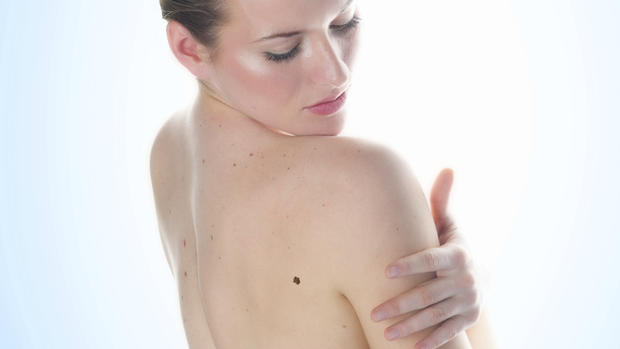Melanoma skin cancers doubled in past 30 years, CDC says
Rates of melanoma -- the deadliest form of skin cancer -- doubled over the last three decades, according to a report released Tuesday by the Centers for Disease Control and Prevention.
The CDC says melanoma rates increased from 11.2 cases per 100,000 people in 1982 to 22.7 cases per 100,000 in 2011. Melanoma is responsible for more than 9,000 skin cancer deaths in the U.S. each year.
"The rate of people getting melanoma continues to increase every year compared to the rates of most other cancers, which are declining," Dr. Lisa Richardson, the director of the Division of Cancer Prevention and Control, said in a statement. "If we take action now, we can prevent hundreds of thousands of new cases of skin cancers, including melanoma, and save billions of dollars in medical costs."
The annual cost of treating new melanoma cases hit $457 million in 2011. By 2030, it's expected to nearly triple to $1.6 billion.
Health officials say more than 90 percent of melanoma skin cancers are due to UV radiation exposure from the sun.
CDC director Dr. Tom Frieden offered some common-sense advice to reduce the risk: "Protect yourself from the sun by wearing a hat and clothes that cover your skin. Find some shade if you're outside, especially in the middle of the day when the dangerous rays from the sun are most intense, and apply broad-spectrum sunscreen."
Broad-spectrum sunscreens protect against two types of ultraviolet radiation: UVA rays, which contribute to skin aging and wrinkling, and UVB rays, which cause sunburns. Both have been linked to skin cancer risk. Sunscreens with an SPF (sun protection factor) of 30 to 50 are recommended; experts say formulas that brag about SPFs higher than 50 offer no appreciable extra protection.
The CDC estimates that 20 percent of new melanoma cases currently projected to occur between 2020 and 2030 could be avoided by adopting comprehensive skin cancer prevention programs that involve public education, restricting teen access to indoor tanning, and encouraging communities to increase sun protection in recreation areas.
